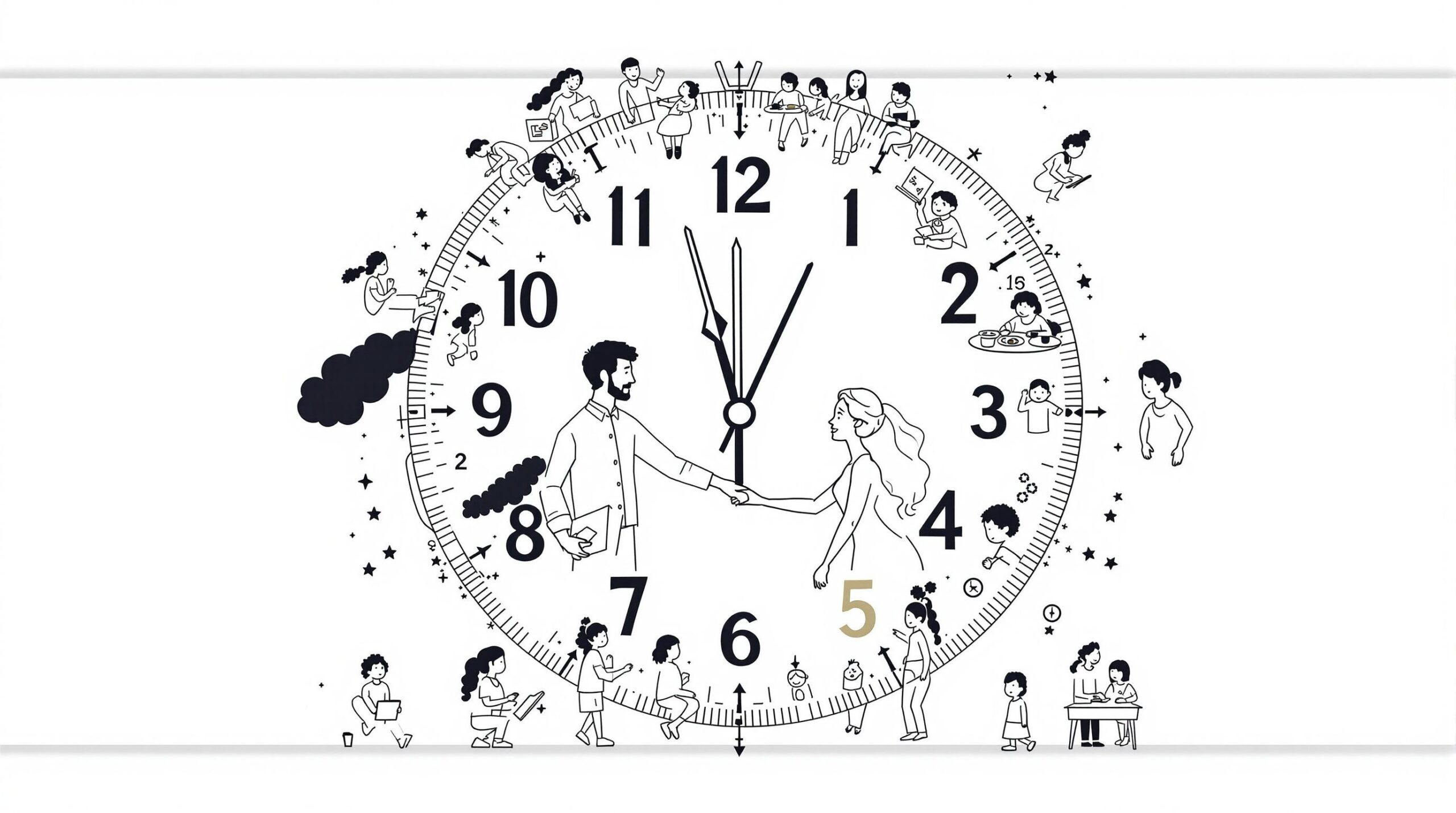Table of Contents
ToggleBalancing family life, work commitments, and personal time can feel like an impossible juggling act. As a parent, I’ve experienced firsthand how crucial effective time management is for maintaining harmony and reducing stress in busy households. Let’s dive into some practical strategies that can help families make the most of their time together while navigating the demands of modern life.
The Importance of Time Management for Families
Time management isn’t just about squeezing more tasks into our days. It’s about creating space for what truly matters. For families, mastering this skill can lead to reduced stress levels, improved productivity, and stronger bonds between family members. Studies have shown that families who prioritize time management report higher levels of satisfaction and well-being.
However, today’s families face unique challenges when it comes to managing time. The constant pull of digital devices, increasing work demands, and a culture that often values busyness over balance can make it difficult to carve out quality family time. This makes it even more essential to develop effective time management strategies that work for your family’s specific needs and circumstances.

Understanding Child Development Stages and Time Management
To create time management strategies that truly work for your family, it’s essential to consider your children’s developmental stages. Jean Piaget’s theory of cognitive development outlines four distinct stages that children progress through as they grow:
Sensorimotor Stage (Birth to 18-24 months)
During this stage, babies and toddlers learn about the world through their senses and motor actions. A crucial concept developed during this period is object permanence – the understanding that objects continue to exist even when they can’t be seen. This concept is fundamental for children to grasp the idea of schedules and future events.
Preoperational Stage (2 to 7 years)
Children in this stage begin to use symbols and language but still struggle with logic and taking the perspective of others. They may have difficulty understanding abstract concepts of time, making it challenging to follow complex schedules.
Concrete Operational Stage (7 to 11 years)
At this stage, children develop logical thinking about concrete objects and situations. They can better understand cause and effect, which aids in grasping the concept of time management and planning.
Formal Operational Stage (11 years and older)
Adolescents in this stage can think abstractly and hypothetically. They’re capable of more sophisticated time management and can often handle their own schedules with guidance.
Understanding these stages can help parents tailor their time management approaches to their children’s cognitive abilities, setting realistic expectations and avoiding frustration.
Tailoring Time Management Strategies to Developmental Milestones
Beyond cognitive development, it’s crucial to consider your child’s physical and social-emotional milestones when crafting time management strategies. These milestones include the development of gross motor, fine motor, communication, cognitive, and social-emotional skills.
For example, by 60 months (5 years), most children can catch a ball, balance on one foot, and skip. These physical abilities open up new possibilities for structured activities and sports, which can be incorporated into family schedules.
At 12 months, toddlers typically begin walking independently and saying their first words. This newfound mobility and communication can significantly impact daily routines and time management needs.
By aligning your time management strategies with these milestones, you can create more effective and age-appropriate plans. For instance, you might introduce simple chore charts for preschoolers to help them understand the concept of tasks and time, while older children might benefit from digital calendar apps to manage their own schedules.
Creating a Family Schedule That Works
One of the cornerstones of effective family time management is creating a schedule that works for everyone. This process should involve all family members, including children who are old enough to participate. By giving everyone a voice, you’re more likely to create a schedule that everyone will stick to.
Start by listing all regular commitments – work hours, school times, extracurricular activities, and important household tasks. Then, work together to fill in the gaps with family time, individual pursuits, and necessary downtime.
Visual aids can be incredibly helpful, especially for younger children. Consider using a large wall calendar or a colorful chart that everyone can see and understand. For tech-savvy families, shared digital calendars can be a great tool for keeping everyone on the same page.
Remember, consistency is key when it comes to family schedules. Try to maintain regular meal times, bedtimes, and wake-up times, even on weekends. This routine helps children feel secure and makes time management easier for everyone.
Prioritizing Tasks and Activities
With limited hours in the day, it’s crucial to prioritize tasks and activities effectively. One useful tool for this is the Eisenhower Matrix, which categorizes tasks based on their urgency and importance.
Here’s how to use it:
- Urgent and Important: Do these tasks immediately (e.g., sick child, work deadline)
- Important but Not Urgent: Schedule these tasks (e.g., family game night, exercise)
- Urgent but Not Important: Delegate these tasks if possible (e.g., some household chores)
- Neither Urgent nor Important: Eliminate these tasks or do them only if time allows
By using this matrix, you can focus on what truly matters and reduce time spent on less critical activities. It’s also important to strike a balance between work, school, and family activities. Remember, sometimes the most important task is simply spending quality time together.
Effective Communication for Better Time Management
Open communication is the foundation of successful family time management. Regular family meetings can be an excellent forum for discussing schedules, addressing concerns, and celebrating successes.
Interestingly, studies have shown a significant gap between how much kids and parents talk about online issues. Bridging this communication gap is crucial for managing screen time and ensuring online safety, which are important aspects of modern family time management.
To improve family communication:
- Set aside dedicated time for family discussions
- Practice active listening
- Encourage all family members to express their thoughts and feelings
- Be clear about expectations and consequences
- Use “I” statements to express concerns without blame
By fostering open communication, you’ll be better equipped to handle time management challenges as they arise.
Leveraging Technology for Family Time Management
While technology can sometimes be a distraction, it can also be a powerful tool for family time management. There are numerous apps and digital tools designed to help families coordinate schedules, assign tasks, and track progress.
Some popular options include:
- Shared calendar apps (e.g., Google Calendar, Cozi)
- Task management apps (e.g., Trello, Asana)
- Meal planning apps (e.g., Mealime, Plan to Eat)
- Chore tracking apps (e.g., ChoreMonster, OurHome)
However, it’s crucial to use these tools mindfully and to manage screen time for the whole family. Set up parental controls and discuss online safety regularly, especially considering that 75% of kids have faced online threats.
Remember, technology should enhance your family’s time management, not dominate it. Always balance screen time with other activities, including face-to-face interaction and outdoor play.
Incorporating Fun and Educational Activities into Family Time
Effective time management doesn’t mean scheduling every minute with productive tasks. It’s equally important to plan for fun and relaxation. Look for activities that combine learning with enjoyment – often called “edutainment” – to keep children engaged while developing valuable skills.
Some ideas include:
- Family game nights that teach strategy and time management
- Cooking together, which combines math, chemistry, and life skills
- Nature walks that incorporate science and physical activity
- DIY projects that foster creativity and planning skills
These activities not only provide quality family time but also help children develop time management skills in a fun, low-pressure environment.
Teaching Children Time Management Skills
Teaching kids self-discipline and responsibility, including time management skills, is one of the most valuable gifts we can give them. Start with age-appropriate strategies and gradually increase complexity as children grow.
For younger children:
- Use visual timers to make abstract time concepts more concrete
- Create simple picture-based checklists for daily routines
- Offer choices within set time frames to foster decision-making skills
For older children and teens:
- Teach them to use planners or digital calendars
- Help them break large tasks into smaller, manageable steps
- Encourage them to estimate how long tasks will take and then track actual time spent
Consider implementing a reward system for good time management, but be careful not to overly rely on external motivators. The goal is to help children develop intrinsic motivation and a sense of accomplishment from managing their time well.
Dealing with Time Management Challenges
Even with the best planning, families will inevitably face time management challenges. Unexpected events, schedule conflicts, and periods of high stress can all throw carefully laid plans into disarray.
To handle these challenges:
- Build some flexibility into your schedules
- Have backup plans for common scenarios (e.g., childcare falling through)
- Teach children to be adaptable and resilient in the face of changes
- Practice stress-management techniques as a family
- Don’t be afraid to say no to non-essential commitments during busy periods
Remember, the goal of time management isn’t perfection – it’s creating a system that helps your family thrive most of the time while being able to handle the inevitable bumps in the road.
Evaluating and Adjusting Your Family’s Time Management Strategies
Effective time management is an ongoing process, not a one-time fix. Regularly review and update your strategies to ensure they’re still working for your family. This is especially important as children grow and family dynamics change.
Set aside time every few months to assess your current system:
- What’s working well?
- What areas are causing stress or conflict?
- Have your family’s needs or priorities changed?
- Are there new tools or techniques you could try?
Involve the whole family in this evaluation process. Children may have valuable insights into what’s working for them and what isn’t. Be open to trying new approaches and don’t be discouraged if something that worked well in the past is no longer effective.
As your children grow, gradually give them more responsibility for managing their own time. This not only lightens your load but also prepares them for independence.
Remember, the ultimate goal of family time management isn’t to cram more activities into each day. It’s about creating a balanced, harmonious family life where everyone feels valued, supported, and has time for what truly matters. With patience, flexibility, and a willingness to keep learning and adjusting, you can develop time management strategies that work for your unique family situation.
By implementing these strategies and continually refining your approach, you’ll be well on your way to motivating your child without nagging and creating a more organized, less stressful family life. Remember, it’s not about being perfect – it’s about finding what works best for your family and enjoying the journey together.
Sources:
Jean Piaget’s Stages: 4 Stages of Cognitive Development & Theory
Evidence-based milestone ages as a framework for developmental surveillance
Consumer Education Websites: A Guide to Creating a Family-Friendly Experience












This Post Has One Comment
Pingback: The Best Self-Care Strategies for Busy Parents – GuideForKids
Comments are closed.